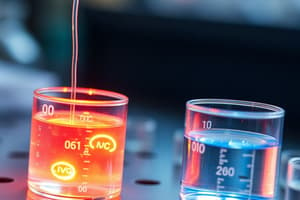Podcast
Questions and Answers
What is an electrochemical cell?
What is an electrochemical cell?
A device that converts chemical energy into electrical energy.
What two types of electrochemical cells are mentioned?
What two types of electrochemical cells are mentioned?
Galvanic cells and electrolytic cells.
What does the Nernst equation calculate?
What does the Nernst equation calculate?
The emf of a galvanic cell.
What is the standard potential of the cell?
What is the standard potential of the cell?
What is resistivity?
What is resistivity?
What is conductivity?
What is conductivity?
Define molar conductivity.
Define molar conductivity.
What chemical reaction is involved in the Daniell cell?
What chemical reaction is involved in the Daniell cell?
What is the electrical potential of the Daniell cell under standard conditions?
What is the electrical potential of the Daniell cell under standard conditions?
An external opposing potential can stop the reaction in a galvanic cell.
An external opposing potential can stop the reaction in a galvanic cell.
What happens when the opposing voltage reaches 1.1 V?
What happens when the opposing voltage reaches 1.1 V?
The electrochemical methods are important for which of the following?
The electrochemical methods are important for which of the following?
Flashcards are hidden until you start studying
Study Notes
Electrochemistry Overview
- Electrochemistry involves the correlation between chemical reactions and electrical energy.
- Chemical reactions can generate electrical energy, while electrical energy can drive non-spontaneous chemical reactions.
Electrochemical Cells
- Two primary types: galvanic (voltaic) cells and electrolytic cells.
- Galvanic cells convert chemical energy from spontaneous reactions into electrical energy, e.g., Daniell cell.
Daniell Cell Specifics
- The reaction: Zn(s) + Cu²⁺(aq) → Zn²⁺(aq) + Cu(s) produces a potential of 1.1 V at standard concentration (1 mol dm⁻³).
- The cell operates spontaneously until external voltage equals the cell potential (1.1 V), at which point the reaction ceases.
Nernst Equation and Standard Potential
- The Nernst equation is utilized to calculate the electromotive force (emf) of galvanic cells.
- It relates the standard cell potential to the Gibbs energy and the equilibrium constant of a reaction.
Conductivity Concepts
- Key definitions: resistivity (r), conductivity (k), and molar conductivity (Λm) are essential to understand ionic solutions.
- Conductivity varies based on the concentration and type of ionic solution.
Kohlrausch’s Law
- It describes the variation of molar conductivity with dilution.
- It is crucial for understanding conductivity in ionic solutions and its applications.
Applications of Electrochemistry
- Electrochemical processes are used for producing metals and chemicals such as sodium hydroxide and chlorine.
- Batteries, fuel cells, and electrolytic methods convert chemical energy to electrical energy efficiently.
Importance of Electrochemical Studies
- Understanding electrochemical processes aids in developing eco-friendly technologies.
- Electrochemistry has wide-ranging applications across various fields due to its interdisciplinary nature.
Measurement Techniques
- Conductivity of electrolytic solutions can be measured and molar conductivity calculated using specific methods.
- Variation in conductivity with concentration is significant for practical applications.
Corrosion and Electrochemical Processes
- Corrosion is defined as an electrochemical process, leading to material degradation.
- Knowledge of electrochemical principles helps in preventing and mitigating corrosion effects.
Studying That Suits You
Use AI to generate personalized quizzes and flashcards to suit your learning preferences.




